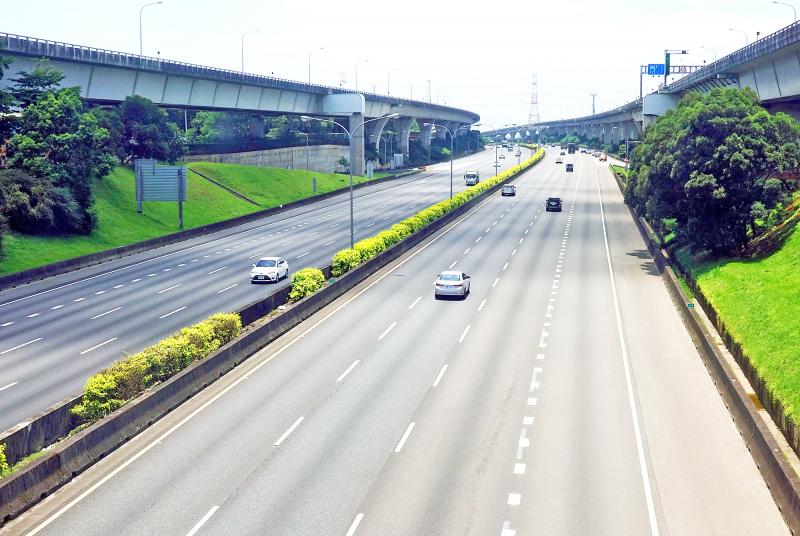Freeway traffic volume on Sunday, the second day of the Dragon Boat Festival long weekend, dropped 63 percent compared with last year as most people have refrained from traveling amid a nationwide level 3 COVID-19 alert, the Freeway Bureau said yesterday.
Last year, the long weekend began on Thursday and ended on Sunday, while this year it began on Saturday and ended yesterday.
Bureau data showed that the traffic volume on the second day of the long weekend this year was 43.3 million vehicle kilometers (MVK), down from 114.3MVK last year.

Photo: CNA
About 760,000 vehicles were on freeways on Sunday, down from 1.51 million last year, the bureau said.
The number of vehicles traveling more than 150km dropped by about 71 percent, it said.
“We have urged people to reduce travel across different regions in compliance with the government’s disease prevention policy. Large passenger vehicles and logistics service vehicles should have priority for accessing freeways,” the bureau said.
On Thursday last week, the bureau said that it aimed to reduce the number of vehicles on freeways to about 1 million per day.
To deter road trips, the bureau extended vehicles’ wait times on feeder roads to freeways, and closed all shopping areas and food courts at freeway rest areas.
On Saturday, freeway traffic volume was down 56.6 percent at 52MVK, bureau data showed. The number of vehicles traveling more than 150km decreased 65 percent.
However, the high-intensity traffic control measures backfired as freeway commuters and logistics vehicle drivers were reported to have waited on feeder roads for more than an hour before they could access freeways.
After motorists criticized the measures, Minister of Transportation and Communications Wang Kwo-tsai (王國材) on Sunday said that, from 4pm that day, freeway traffic would be adjusted to the same volume as on regular weekends.

The Chinese military has built landing bridge ships designed to expand its amphibious options for a potential assault on Taiwan, but their combat effectiveness is limited due to their high vulnerability, a defense expert said in an analysis published on Monday. Shen Ming-shih (沈明室), a research fellow at the Institute for National Defense and Security Research, said that the deployment of such vessels as part of the Chinese People’s Liberation Army (PLA) Navy’s East Sea Fleet signals a strong focus on Taiwan. However, the ships are highly vulnerable to precision strikes, which means they could be destroyed before they achieve their intended

The first two F-16V Bock 70 jets purchased from the US are expected to arrive in Taiwan around Double Ten National Day, which is on Oct. 10, a military source said yesterday. Of the 66 F-16V Block 70 jets purchased from the US, the first completed production in March, the source said, adding that since then three jets have been produced per month. Although there were reports of engine defects, the issue has been resolved, they said. After the jets arrive in Taiwan, they must first pass testing by the air force before they would officially become Taiwan’s property, they said. The air force

GLOBAL: Although Matsu has limited capacity for large numbers of domestic tourists, it would be a great high-end destination for international travelers, an official said Lienchiang County’s (Matsu) unique landscape and Cold War history give it great potential to be marketed as a destination for international travelers, Tourism Administration Director General Chen Yu-hsiu (陳玉秀) said at the weekend. Tourism officials traveled to the outlying island for the Matsu Biennial, an art festival that started on Friday to celebrate Matsu’s culture, history and landscape. Travelers to Matsu, which lies about 190km northwest of Taipei, must fly or take the state-run New Taima passenger ship. However, flights are often canceled during fog season from April to June. Chen spoke about her vision to promote Matsu as a tourist attraction in

PAWSITIVE IMPACT: A shop owner said that while he adopted cats to take care of rodents, they have also attracted younger visitors who also buy his dried goods In Taipei’s Dadaocheng (大稻埕), cats lounging in shops along Dihua Street do more than nap amid the scent of dried seafood. Many have become beloved fixtures who double as photography models, attracting visitors and helping boost sales in one of the capital’s most historic quarters. A recent photo contest featuring more than a dozen shop cats drew more than 2,200 submissions, turning everyday cat-spotting into a friendly competition that attracted amateur and professional photographers. “It’s rare to see cats standing, so when it suddenly did, it felt like a lucky cat,” said Sabrina Hsu (徐淳蔚), who won the NT$10,000 top prize in